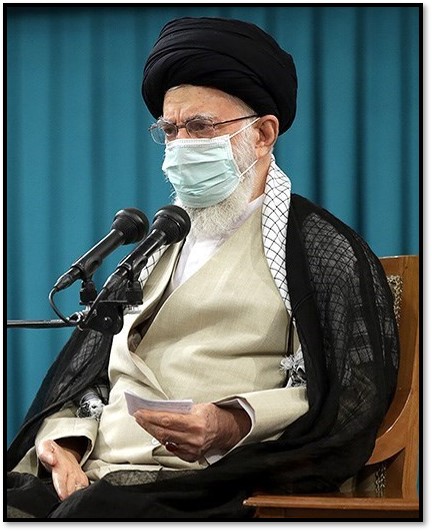
On October 24, Supreme Leader Ayatollah Ali Khamenei denounced countries that had established diplomatic ties with Israel. “They sinned by normalizing relations with the usurping, despotic Zionist regime,” he said in a speech marking the birthday of the Prophet Muhammad. Khamenei appeared to be referring to Bahrain, the United Arab Emirates, Morocco, and Sudan. “They should turn back from this path and compensate for this grave mistake.” In 2020, the four Arab countries agreed to establish ties with Israel as part of the U.S.-brokered Abraham Accords. The new Middle East peace deals, the first in more than a quarter century, dramatically changed the core alliances in the world’s most volatile region and increased pressure on Iran.
Khamenei also accused the United States of deepening divisions between Muslims. “The puppets installed by the U.S. create discord in the world of Islam wherever they can.” He held the United States partially responsible for the wave of violence against the Shiite minority in Afghanistan. “The sorrowful and heart-wrenching explosions in Afghanistan’s mosques … are a case in point which was carried out by DAESH (ISIS), and the Americans openly stated that they created DAESH,” he alleged. For years, Khamenei has accused the United States of creating ISIS using funds from Saudi Arabia. The following are excerpts from Khamenei’s speech at the 35th International Islamic Unity Conference arranged by topic.
On the Palestinians and Israel
“If the unity of Palestine and of Muslims is realized, the issue of Palestine will definitely be resolved in the best way. The more serious we are about the Palestinian cause for the sake of asserting the rights of the Palestinian nation, the closer we will be to the realization of unity between Muslims.”
“Unfortunately, some governments made a mistake. They made a big mistake. They sinned by normalizing relations with the usurping, despotic Zionist regime. This move is against Islamic unity and solidarity. They should turn back from this path and compensate for this grave mistake.”
On Afghanistan
“The closest example is the tragic events that have taken place in Afghanistan the last two Fridays where they blew up a mosque with the Muslims in it while they were praying. Who blew these up? DAESH [ISIS]. Who is DAESH? DAESH is the same group that the Americans—the Democrats in the United States—have clearly stated, ‘We created them.’ Of course, they do not acknowledge this at the present time. They deny it now.”
“In the case of Afghanistan for example, when I say that we need to formulate plans, one way to prevent these attacks is for the current, esteemed Afghan officials to go to the mosques themselves and to say their prayers there. Or they should encourage the Sunni brothers to participate in these centers.”
Islamic Unity
“The Muslims’ unity is definitely a Quranic obligation. Why are we trying to turn it into a mere moral issue? This is a command and a decree.”
“Cooperation between the Muslims is necessary. If the Muslims are united, they will help each other, and they will all become strong. Even those who are interested in interacting with non-Muslims, and there is no objection to interacting with non-Muslims, will enter into such interactions with full hands. This will come about when this state of cooperation exists.”
“The puppets installed by the U.S. create discord in the world of Islam wherever they can.”
On Islamic Civilization
“From the viewpoint of these [anti-Islamic] powers, important areas of life and social relations must be separated from the interference of Islam. With regards to the management of society, building civilization and in accordance with this inwardly political and ostensibly intellectual tendency, Islam has no role in the construction of human civilization and it has no duty and no possibility of helping in this.”
“We should embark on clarifying the viewpoint of Islam about itself and about those aspects of life where it has given an opinion… What Islam states is that the field of activity of this religion is all of human life, ranging from human emotions to social, political and international issues. It also includes issues related to all of humanity.”
